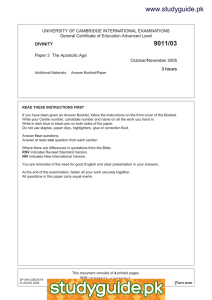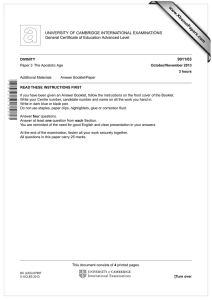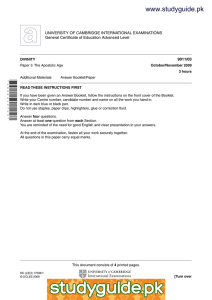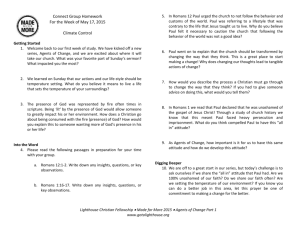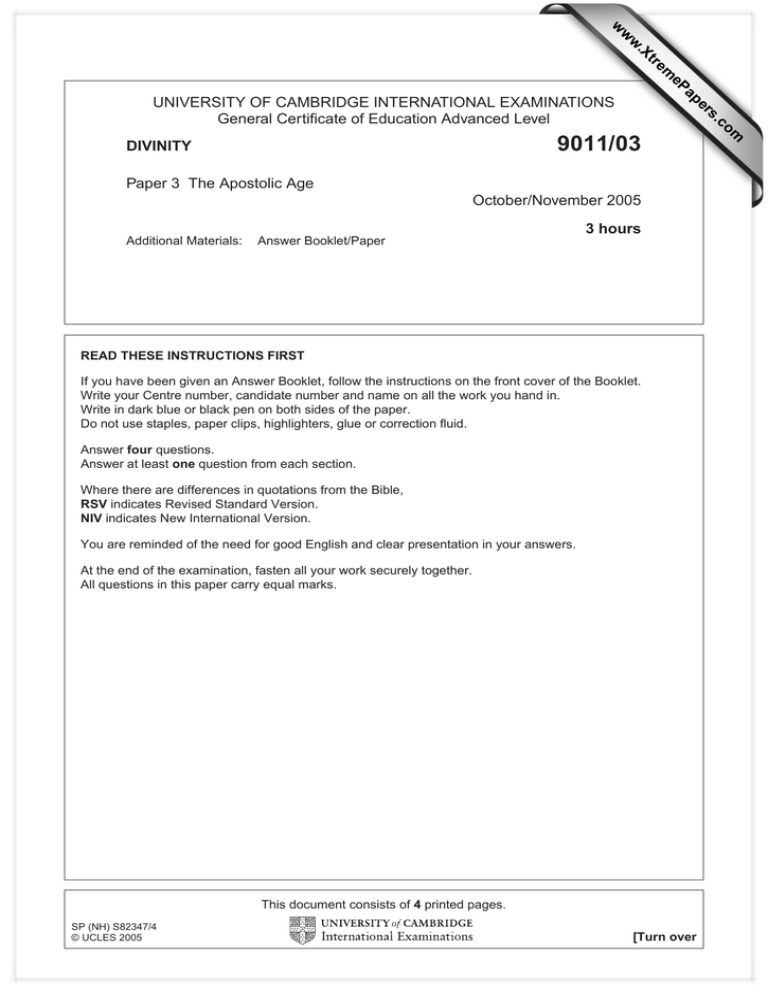
w
w
ap
eP
m
e
tr
.X
w
9011/03
DIVINITY
Paper 3 The Apostolic Age
October/November 2005
3 hours
Additional Materials:
Answer Booklet/Paper
READ THESE INSTRUCTIONS FIRST
If you have been given an Answer Booklet, follow the instructions on the front cover of the Booklet.
Write your Centre number, candidate number and name on all the work you hand in.
Write in dark blue or black pen on both sides of the paper.
Do not use staples, paper clips, highlighters, glue or correction fluid.
Answer four questions.
Answer at least one question from each section.
Where there are differences in quotations from the Bible,
RSV indicates Revised Standard Version.
NIV indicates New International Version.
You are reminded of the need for good English and clear presentation in your answers.
At the end of the examination, fasten all your work securely together.
All questions in this paper carry equal marks.
This document consists of 4 printed pages.
SP (NH) S82347/4
© UCLES 2005
[Turn over
om
.c
s
er
UNIVERSITY OF CAMBRIDGE INTERNATIONAL EXAMINATIONS
General Certificate of Education Advanced Level
2
Section A
Answer at least one question from this section.
If you choose question 1, answer in one version only.
Romans and James
REVISED STANDARD VERSION
1
Comment on points of interest or difficulty in four of the following, with brief reference to the
general context:
(a) Ever since the creation of the world his invisible nature, namely, his eternal power and deity,
has been clearly perceived in the things that have been made. So they are without excuse …
(Romans 1:20)
(b) He received circumcision as a sign or seal of the righteousness which he had by faith while he
was still uncircumcised. The purpose was to make him the father of all who believe without
being circumcised and who thus have righteousness reckoned to them.
(Romans 4:11)
(c) But if some of the branches were broken off, and you, a wild olive shoot, were grafted in their
place to share the richness of the olive tree, do not boast over the branches. If you do boast,
remember it is not you that support the root, but the root that supports you. (Romans 11:17–18)
(d) Greet Prisca and Aquila, my fellow workers in Christ Jesus, who risked their necks for my life,
to whom not only I but also all the churches of the Gentiles give thanks; greet also the church
in their house.
(Romans 16:3–5a)
(e) What does it profit, my brethren, if a man says he has faith but has not works? Can his faith
save him?
(James 2:14)
(f)
Therefore confess your sins to one another, and pray for one another, that you may be
healed. The prayer of a righteous man has great power in its effects.
(James 5:16)
© UCLES 2005
9011/03 O/N/05
3
NEW INTERNATIONAL VERSION
1
Comment on points of interest or difficulty in four of the following, with brief reference to the
general context:
(a) For since the creation of the world God’s invisible qualities – his eternal power and divine
nature – have been clearly seen, being understood from what has been made, so that men
are without excuse.
(Romans 1:20)
(b) And he received the sign of circumcision, a seal of the righteousness that he had by faith
while he was still uncircumcised. So then, he is the father of all who believe but have not been
circumcised, in order that righteousness might be credited to them.
(Romans 4:11)
(c) If some of the branches have been broken off, and you, though a wild olive shoot, have been
grafted in among the others and now share in the nourishing sap from the olive root, do not
boast over those branches. If you do, consider this: You do not support the root, but the root
supports you.
(Romans 11:17–18)
(d) Greet Priscilla and Aquila, my fellow-workers in Christ Jesus. They risked their lives for me.
Not only I but all the churches of the Gentiles are grateful to them. Greet also the church that
meets at their house.
(Romans 16:3–5a)
(e) What good is it, my brothers, if a man claims to have faith but has no deeds? Can such faith
save him?
(James 2:14)
(f)
Therefore confess your sins to each other and pray for each other so that you may be healed.
The prayer of a righteous man is powerful and effective.
(James 5:16)
2
Examine the main ideas which Paul uses in Romans to explain the significance of the death of
Christ.
3
Give an account of Paul’s teaching in Romans on the Spirit.
4
Discuss the reasons why some scholars have argued that the Epistle of James is a Jewish rather
than a Christian document.
© UCLES 2005
9011/03 O/N/05
[Turn over
4
Section B
Answer at least one question from this section.
5
‘But you shall receive power when the Holy Spirit has come upon you; and you shall be my
witnesses in Jerusalem and in all Judea and Samaria and to the end of the earth.’ (Acts 1:8 RSV)
‘But you will receive power when the Holy Spirit comes on you; and you will be my witnesses in
Jerusalem, and in all Judea and Samaria, and to the ends of the earth.’
(Acts 1:8 NIV)
How far does this verse set out the main themes of Acts 1–21:15?
6
Assess the importance of Stephen and Barnabas in the development of the ministry and mission
of the early church.
7
‘While Paul may have been acknowledged as the Apostle to the Gentiles, it was rather through the
ministry of Peter that membership of the church was opened to the Gentiles and they were
welcomed into its fellowship.’
How far does the evidence of Acts, and the letters of Paul, which you have studied for this paper,
support this statement?
8
Why did Paul find it necessary to defend his apostleship in Galatians and 1 Corinthians? How did
he justify his claim to be a true apostle?
9
Examine the ethical teaching in Colossians and the principles on which it is based.
10 Discuss the authorship, date and purpose of Hebrews.
Copyright Acknowledgements:
Scripture quotations marked (RSV) are taken from the Revised Standard Version of the Bible, copyright © 1946, 1952 and 1971 by the Division of Christian
Education of the National Council of the Churches of Christ in the USA. Used by permission. All rights reserved.
Scriptures quotations marked (NIV) are taken from the HOLY BIBLE, NEW INTERNATIONAL VERSION ® NIV ® Copyright © 1973, 1978, 1984 by International
Bible Society. Used by permission of International Bible Society. All rights reserved world-wide.
Permission to reproduce items where third-party owned material protected by copyright is included has been sought and cleared where possible. Every
reasonable effort has been made by the publisher (UCLES) to trace copyright holders, but if any items requiring clearance have unwittingly been included, the
publisher will be pleased to make amends at the earliest possible opportunity.
University of Cambridge International Examinations is part of the University of Cambridge Local Examinations Syndicate (UCLES), which is itself a department of
the University of Cambridge.
© UCLES 2005
9011/03 O/N/05

